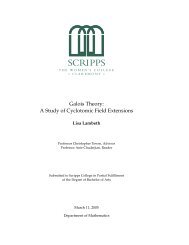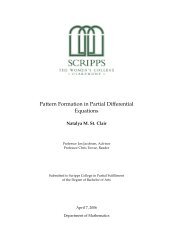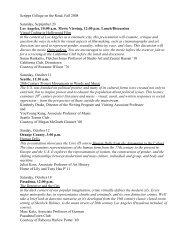Sophie Germain: mathématicienne extraordinaire - Scripps College
Sophie Germain: mathématicienne extraordinaire - Scripps College
Sophie Germain: mathématicienne extraordinaire - Scripps College
Create successful ePaper yourself
Turn your PDF publications into a flip-book with our unique Google optimized e-Paper software.
<strong>Sophie</strong> <strong>Germain</strong>’s Theorems 57<br />
We have already assumed that x is divisible by q. Then<br />
2x = (x + z) + (x + y) − (y + z) = b p + c p − a p ≡ 0 (mod q).<br />
By condition 2, q|abc. Since q is prime, then q must divide exactly one of a,<br />
b, or c.<br />
Suppose q divides b. Then<br />
−bβ ≡ 0 (mod q)<br />
y ≡ 0 (mod q).<br />
This implies that q|y, which contradicts our assumption that x, y, and z are<br />
relatively prime. So b ≢ 0 (mod q).<br />
Similarly, we find that c ≢ 0 (mod q), so q ∤ c.<br />
Thus q|a. Then we have<br />
a ≡ 0 (mod q)<br />
a p ≡ 0 (mod q)<br />
y + z ≡ 0 (mod q)<br />
y ≡ −z (mod q)<br />
Recall from the proof of Claim 5.1 that z = −y gives us<br />
y p−1 − y p−2 z + y p−3 z 2 + · · · − yz p−2 + z p−1 ≡ py p−1 (mod q)<br />
so, α p ≡ py p−1 (mod q).
















